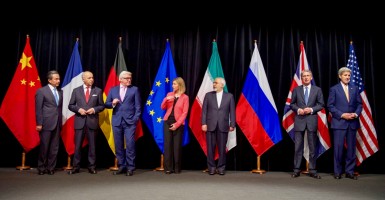As Congress spends its August recess deliberating the Iran deal, Michigan has introduced two resolutions this week urging U.S. legislators to oppose the accord. The state House is also moving to preserve its sanctions against Tehran regardless of the agreement’s fate.
“Certainly, there are several members of Congress both in the House and the Senate who are opposed to this deal so I think it would reinforce or embolden their votes when they see resolutions like this emanating from their state legislatures,” Republican state Rep. Tim Kelly, the author of the first resolution, told The Daily Signal.
Kelly’s resolution details skepticisms of the accord and outlines Michigan’s intention to continue to prohibit companies in the state from doing business with Iran.
He said because the deal is not a U.S. treaty, Michigan is enabled under the 10th Amendment to continue its 2012 sanctions that divest state pension funds from businesses with ties to Tehran and block those companies from receiving government contracts.
“Here in Michigan we view this as an awful deal for America … This resolution adds to the crescendo of the people opposed to this deal,” Kelly said, pointing to recent polls finding the majority of Americans want Congress to reject the accord.
Democratic state Rep. Andy Schor introduced the second resolution, which claims the current deal does not block a path to a nuclear weapon and urges Congress to press for a new agreement that accomplishes this goal.
Both resolutions contend the accord leaves Iran’s nuclear infrastructure largely intact and argue its allowance for continued research and development on advanced centrifuges—machines that enrich uranium used in nuclear bombs—could spur an arms race in the Middle East.
They also address concerns of cheating, noting while the agreement places limits on Tehran’s nuclear material and requires nuclear site inspections, Iran’s history of deception challenges the international community’s ability to ensure cooperation.
Further, both resolutions note the estimated $150 billion in frozen assets that would be released under the accord coupled with additional sanctions relief would provide Tehran with more funding for “military buildup and state sponsorship of terrorism.”
“We need to focus on ways to support our allies in this region, and this deal only further alienates them while helping Iran grow stronger, creating fear and an arms race in one of the most volatile parts of the world,” Kelly said in a statement.
Steve Bucci, director of The Heritage Foundation’s Allison Center for Foreign Policy Studies, said while the resolutions would not change Iran’s behavior or the White House’s trajectory, their passage would mark a “sharp stick in the eye” to the Obama administration.
“A resolution like this and the possibility of continued sanctions sends a very loud, clear public message to the White House and Washington, D.C., that what you’ve done, we don’t consider it right and we don’t think our beliefs or our concerns have really been addressed, therefore we’re going to oppose this,” Bucci said.
Kelly agreed pressure from across the country likely would not change President Obama’s mind, but remained hopeful toward the impact of the resolutions.
“Any time that we can from all corners of the country or globe resonate and showcase what a bad deal this is, the better,” Kelly said.



























